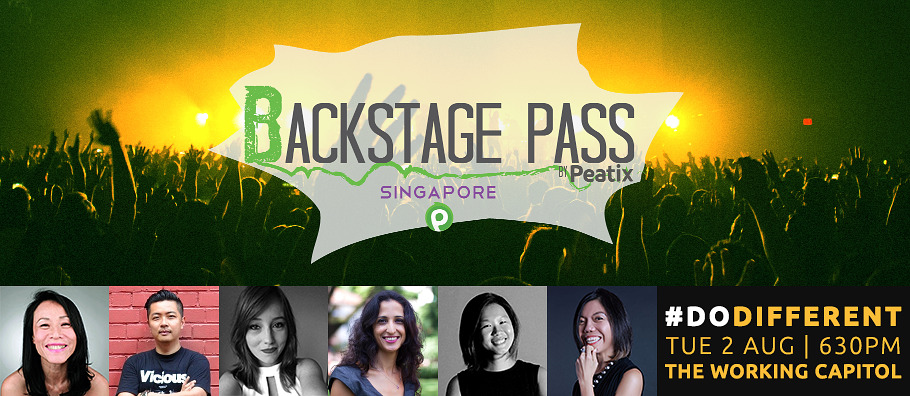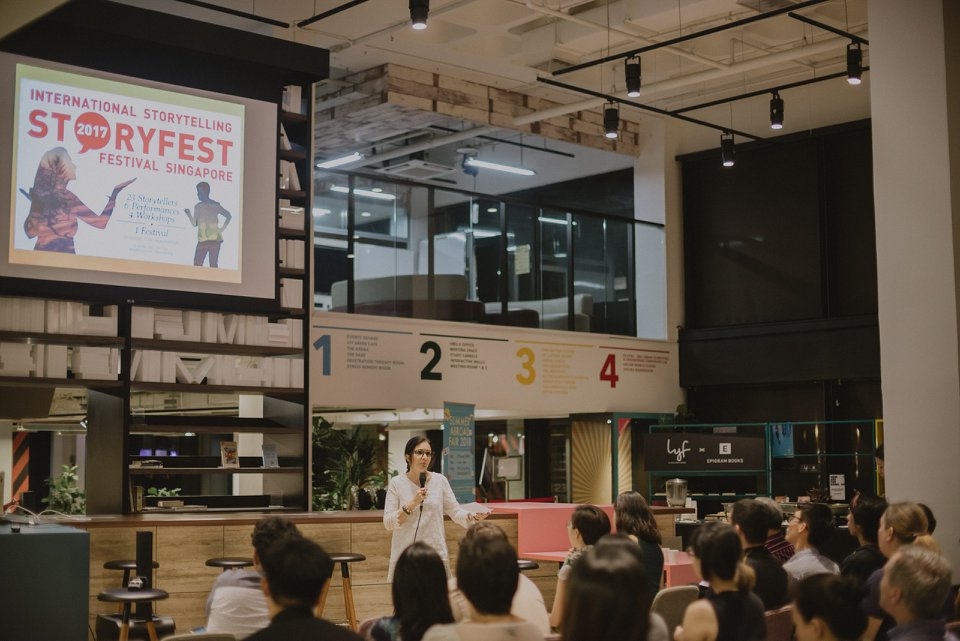In the three years that Peatix has been in Singapore (we launched 31 July 2013!), we’ve been privileged to have witnessed the breadth and depth of creativity that organisers possess here through the events they run.
If it’s an EDM concert, they choose to host it as a picnic in Singapore’s cosmopolitan garden over that of a club.
If it’s an outdoor sports event, they choose to go big or go home with an entire festival complete with 22 sports games and a music concert featuring local bands to end off with a bang.
If it’s an art installation, they choose to have an art walkabout with art displayed in the homes of residents of a neighbourhood steeped in heritage to experience the stories told first-hand.
The list could go on across a wide variety of genres from startups and entrepreneurship, to dating events, to causes and non-profit, to theatre and dance, to food and drink events and more. What they all have in common though, we’ve come to conclude, is that they all do different.
At the 14th edition of Backstage Pass, a community event for event organisers, six community builders in Singapore took the stage to share about how they choose to do different in events for the communities they identify with and wish to build.
We sum up their key takeaways from planning events.
Herman Ho of S.C.U.M. Cinema
S.C.U.M. stands for the Society for Cult & Underground Movies, a group for film fanatics that promote underground, unusual and independent films! They seek to promote dialogue of such films and show that there’s a lot more to film than mega blockbusters.
Takeaways: Sustainability is an issue given its completely self-funded but they get creative and resolve this through asking for donations, selling merchandise, and finding like-minded sponsors. Exposure for independent films is also smaller in general due to their smaller marketing budgets so more effort is needed to gain the interest of new audiences. They overcome this through making attendees fans of their events who then spread news of future screenings through organic word of mouth. Lastly, having time to organise screenings is a struggle as they juggle between day jobs and event organising but no worries there, they’re working on a time machine to help them out.
Yap Zi Jing of Bornfire
Bornfire was born out of a desire to create a safe space for anyone to be silly, have fun, and develop resilience. It is, believe it or not, Singapore’s very own circus festival in its 10th edition already!
Takeaways: Funding is a big issue, and they resolve this through forming close-knit relationships with circus practitioners the world over through finding out about them through YouTube videos and engaging with them thereafter. Through these relationships built, many come to Singapore to give workshops for free simply because they want to join in with the camaraderie of the community here too!
Mouna Auori Langendorf of Woomentum
Woomentum is a crowdfunding platform for female-led startups and they host a live crowdfunding event called CrowdFundHer Live to where these business pitch their ideas in front of a live panel and receive monetary support from members of the audience who choose to back their projects.
Takeaways: Focus on creating value for every person at your event – from your speakers, to your panel, to your audience, to your participants, so as to keep them loving it and wanting more. Track the behavioural outcome you want from your event by firstly defining what it is you want to achieve through hosting your event. This will help you to assess its success. Lastly, gather real feedback to keep improving your event for your community because you’re organising it for them after all.
Anthea Ong of Hush TeaBar
Hush TeaBar seeks to bring the overstressed and overworked executive from rush to hush through mindful tea appreciation in complete silence. They also champion diversity at work and create an inclusive work environment where the deaf community play an integral role in formulating the entire experience.
Takeaways: Advocacy before your event is everything. Know who the key influencers are in your industry or amongst the audience you seek to attract and engage with them to get the word out about your event. With any event, release enough information for your potential attendee to understand what it’s about yet keeping it a little mysterious to rile their curiosity.
Tan Kheng Hua of The Twenty-Something Theatre Festival
The Twenty-Something Theatre Festival gives the craft and voices of twenty-somethings a bigger stage in theatre. Across two weekends, eight brand new plays from both new and established 20-something local playwrights were staged, atypical of the theatre industry where these same 20-somethings would usually join and adapt to the voice of a mature theatre company.
Takeaways: Funding in the arts is always difficult but if you don’t ask, you don’t get. As cheesy as it might sound, you first need to truly believe in and love what you do, and it’ll show for it in the work you produce and in your pitch for funding. Don’t waste time, start doing. At the end of the day, be shameless, be very shameless, but for the right things when organising events.
Stephanie Dickson of The Wedge Asia
The Wedge Asia brings people from around the world to be inspired, learn, and take action to improve themselves, do good, and live consciously. Each month they tackle a thought-provoking topic at their events, like the concept of freedom, fear, and change. They also kickstarted Green Is The New Black, a festival that spurs people on to make conscious decisions for positive change through a series of talks and workshops.
Takeaways: Creatively using WEDGE as an acronym, you can amp up the memorable factor of your event through the following five ways.
- Welcome – This is the first touchpoint of your event, it could range from an updated website, your ticketing page, your social media accounts, or wherever it is your potential attendee will come into contact or knowledge of your event. Ensure that information you provide is clear and consistent.
- Entertain – People like to be entertained. It can be in any form from speakers, to music, to activities.
- Dialogue – Create opportunities for conversation like networking games. Get them feeling involved. They’ll remember how you made them feel at an event, not what you did or said.
- Gifts – People like to win and receive free stuff! Have goodie bags, or raffles to collect name cards. It gets people excited and winners feel rewarded.
- Engage – Provide attendees the avenue to gain clarity in being able to pose questions to the panel, speakers, or anyone else who could shed light on the topic like the producer of a film, or choreographer of a dance. Let attendees feel like they left your event with an action they can take.
Planning events, as we’ve gleaned from the speaker takeaways, take hard work. What attendees see and experience are often the by-product of a passionate team who put in their heart and soul into thinking about every minute aspect of an event so attendees can leave happy and fulfilled.
What ideas, passion, and causes do you champion or hold dear? Like these six community builders, you too can use events to rally like-minded others, and do it in a different way to stay fresh and relevant for the community you identify with or seek to build.





